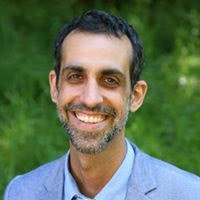Duality. Two sides to every story. Yin and Yang. Push and pull. You know: the stuff that makes up our life.
It is the waters in which we swim, so much so that we do not recognize that we constantly divide almost each and every moment, experience, and interaction into good or bad, or pleasant or unpleasant. When we are in a dual frame of mind, we have a harder time processing complexity and ambiguity, and usually miss half of the story.
Because our relationship to boundaries and to the notion of duality is so immediate and unfiltered, we constantly miss the “hook” and get caught up in the spin and manipulation of others. If you are a politician or a person who is interested in controlling others, you know the old trick: “Us and them . . . right and wrong . . . good and evil.”
Until recently, this kind of mass manipulation worked well. Every side of the political spectrum would hold a somewhat rigid position (a dual position), and people would choose a side.
As we manifested more diversity in our culture, pluralism in our ideals, relativism in our thoughts, freedom to be and collaboration, we also grew the shadow/other side of such ideas.
Inherent in these progressive ideas, a counter force for greater security, unity, clarity, and safety was needed for balance. The collective consciousness was picking up on this tension (or at least on the shadow), but was immediately shamed by the ideological impulse to culturally evolve.
What was not claimed in a truly safe environment was pushed down, never to be spoken. As people felt ashamed to bring up their concerns and worries and to have respectful dialogue with those who disagreed with them, resentment grew. Again, shadow is shadow.
No matter how progressive one is, there is always a “shadow idea” that needs to be seen, heard, and integrated.
Jung (1945) wrote: Filling the conscious mind with ideal conceptions is a characteristic of Western theosophy, but not the confrontation with the shadow and the world of darkness. One does not become enlightened by imagining figures of light, but by making the darkness conscious (CW 13: Alchemical Studies, p. 335).
“Shadow” leaders (and “shadow” media) are using the anger, resentment, and (legitimate) fears as fuel for power. And please notice, no matter what you throw at these people, they just keep getting stronger – facts, jokes, a sense of moral superiority, investigative journalism and other methods won’t break the spell. It can’t work because this type of consciousness is fully immune to these things. In fact, they just make it stronger and more popular.
The leading edge of consciousness (in ideas, morality, values) does not have a proper response, not to Donald Trump, nor to any other political or cultural movement. And yes, this is much bigger then Donald Trump. We might feel that we have power when we march together, or when we share a funny post on social media but, in fact, we are making the “shadow” even stronger (please note: I do not use “shadow” here in a derogatory sense, but as the unconscious side of an idea or position).
Let us consider all those individuals who felt fear, danger, insecurity, and disorientation as more and more progressive ideas penetrated into culture. People who did not feel that their voice mattered, that their fears were legitimate, or that their perspectives were respected.
Maybe you are one of those people (I know I am). You hear a progressive idea for the first time, and initially feel fear, danger, or insecurity. You want to keep an open mind and get excited to ask questions and participate. However, you don’t feel that you are allowed, and you fear that if you share your questions or concerns, you might be judged. Now think how that person might feel when a man like Donald Trump just says whatever he feels like saying. There’s vindication for all of that repression!
Let me be clear: I am not calling to embrace bigotry, misogyny, or racism. I am just pointing to the fact that without allowing people to feel safe to explore their “shadows” around progressive ideas, we won’t be able to move beyond this current crisis.
Bigotry, misogyny, and racism come from fear, which is actually something we can change. Most people can change when they are loved. They change when we don’t want to change them; when we become really interested in listening to what they have to say, and curious about why they behave in the ways they do.
The good news is that we can use this as an opportunity to grow in complexity and to see the limitations of the post-modern era.
It is not enough to condemn how the U.S. administration is behaving. We also need to see them as representing the reaction of people who felt their voices and ideas were unseen and devalued. An embrace of a new state of being, which includes an ability to hold, simultaneously, both sides of the story and the whole story, is deeply needed. In this fusion, a new “human element” can be born.
Final note: This is a simplification of a very complicated topic. I am aware that my ideas have their own “shadows.” Your comments, additional perspectives and viewpoints are welcome.
Shahar Rabi is a registered clinical counsellor and co-founder and director of Education for the New Earth Institute in Vancouver. He has years of experience in treating trauma, addiction, depression, and anxiety. For his work with disadvantaged soldiers, he earned a medal of honour from the president of Israel. Rabi also has a broad spectrum of work experience as a choreographer, philosophy teacher, yoga teacher, and meditation instructor. As a meditation instructor, he draws on years of study and practice with prominent non-dual teachers from various traditions at monasteries in India, Nepal, and Thailand.



